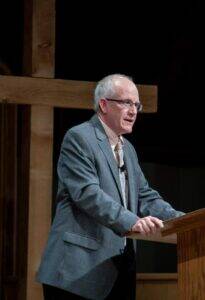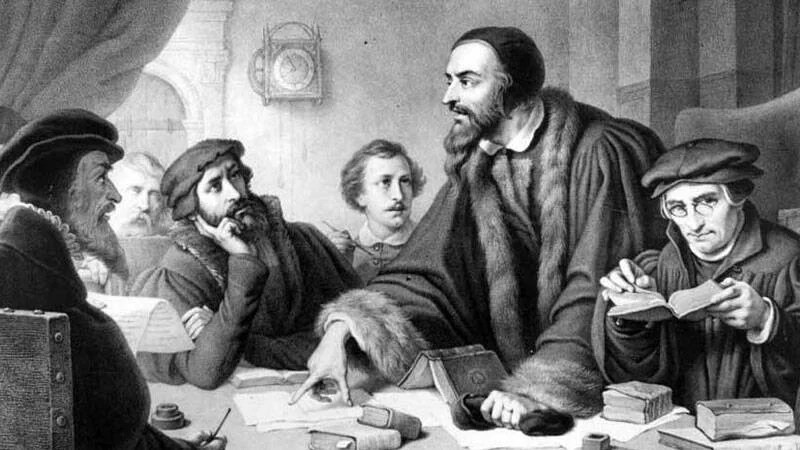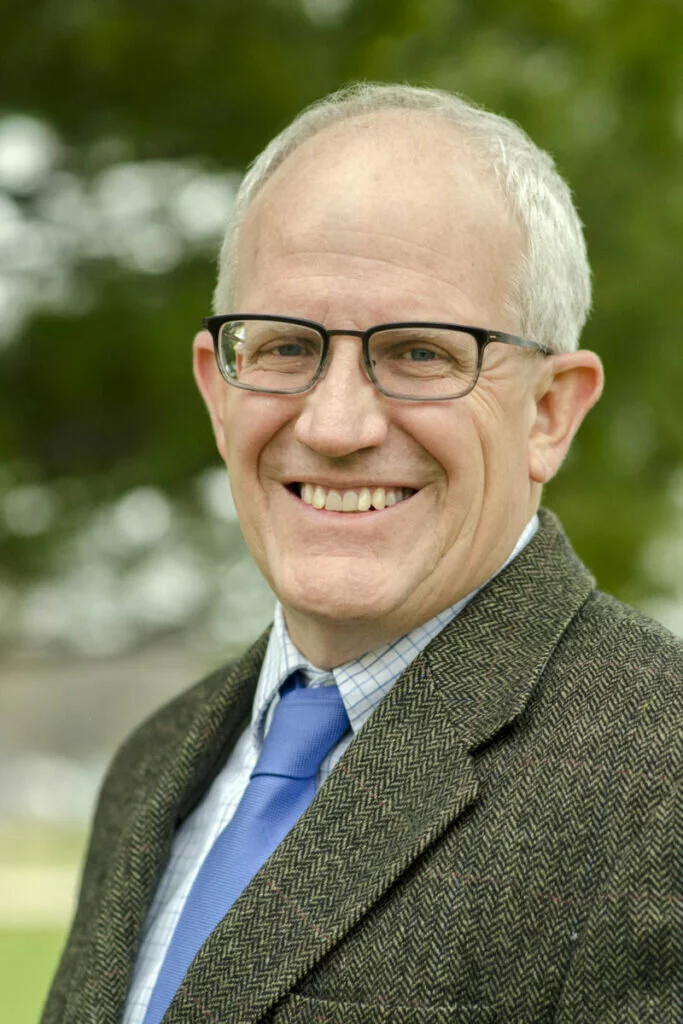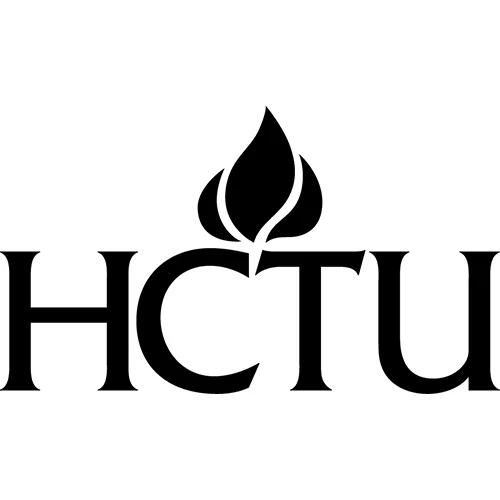As part of its continuing calendar of events, the Henry Center launched its Scripture & Ministry series on Wednesday, led by an insightful presentation from Dr. Scott Manetsch on pastoral collegiality.
Drawing upon his recent work on Calvin’s organizational genius, Dr. Manetsch discussed the model of ministry created by John Calvin in Geneva – the practices and institutions promoting pastoral collegiality, accountability, spiritual vitality, and gospel faithfulness – and how lessons from that model are possibly brought to bear in our present context.
Calvin’s central motivation, which informed every organizational move he made in Geneva, was his unwavering conviction that the proclamation of the word of God was paramount in the pastor’s vocation and the church’s task. Scripture was the foundation of Christian ministry. To this end, Calvin restructured parish life in and around Geneva. He reduced the number of parishes in both the city and the countryside, and  increased the frequency of expositional preaching. Approximately 33 preaching services were held each week in Geneva, aimed to minister to both the servant class and the rest of townsfolk. Calvin himself gave between 16 to 20 sermons per month. Scripture was also attached to a full-blown liturgy while congregational singing of the Psalms was introduced throughout each parish.
increased the frequency of expositional preaching. Approximately 33 preaching services were held each week in Geneva, aimed to minister to both the servant class and the rest of townsfolk. Calvin himself gave between 16 to 20 sermons per month. Scripture was also attached to a full-blown liturgy while congregational singing of the Psalms was introduced throughout each parish.
Calvin endeavored to develop a pastoral culture so steeped in the thorough saturation of God’s Word because he was convinced of scripture’s divine authority and its sole ability to bring salvation to God’s people, renew and build the Christian church, and nourish God’s children.
Calvin’s Institutional Genius
For the preservation of scriptural truth and pastoral wellbeing, Calvin worked to establish several pastoral institutions in Geneva aimed to promote collegiality, accountability, continuing education, unity, and spiritual formation. Four of these institutions deserve specific mention:
Company of Pastors
The Company of Pastors was a weekly gathering of all the city’s pastors with both an internal and external focus. Internally, the Company of Pastors endeavored to ensure right teaching of doctrine, training of new pastors, and oversight of theological education in the city. Pastors offered advice to city magistrates, monitored public worship services, and helped run charitable institutions. They worked also to provide a support group for the care of pastor’s one to another. Externally, this company corresponded with churches throughout Europe, giving advice to foreign churches, raising money for persecuted Protestant churches, and deploying pastoral missionaries. Essential to this institution was the core belief in the equality of ministry. Pastors were not considered to be lone rangers, but rather partnered together in the work of ministry.
Congregation
Congregation was a weekly intensive bible study required by all Geneva’s pastors and open to interested laypeople. This weekly meeting served as an opportunity for pastors to exegete scripture in community. Meetings would often consist of intensive discussion as pastors worked to rightly divide the word of truth, learn together, exhort one another, and build one another up. Calvin believed that scripture should be interpreted in community. Exegesis, as he understood, does not occur simply at the pastor’s desk, but through studying with one another as iron works to sharpen iron. The solitary pastor, for Calvin, was a danger to himself and his congregation.
Quarterly Censure
Four times per year, city ministers gathered together for communal examination and correction. Censure was place where ministers could air grievances and seek reconciliation between one another. Issues pertaining to the teaching of inaccurate doctrine could also be corrected during this meeting. Though heated and contentious at times, Censure proved a vital institution for promoting pastoral unity, reconciliation, and accountability.
Consistory
Calvin also organized the Consistory, a disciplinary body consisting of the Company of Pastors along with 12 lay elders meeting weekly to discuss issues of church discipline. Calvin viewed this institution as not simply punitive, but more importantly as “spiritual medicine.” As it proved in practice, it was particularly strong spiritual medicine administered to both lay people and pastors alike. The Consistory sought to address issues related to gross moral failures while upholding high standard of moral conduct among church members. At its best, Consistory promoted accountability and achieved reconciliation among the church. Calvin’s reform program in Geneva proved effective for the support and care for the longevity of the pastoral office.
Before the establishment of these four institutions, pastoral tenure averaged 3 years per man. Following their establishment, the average rose to 14 years per man, and then later more than 25 years.
What might we learn from Calvin’s Geneva in our present context? Dr. Manetsch offers a few points of application for ministry:
- Proclamation of the Word must be central and essential to the pastor’s vocation. The Word of God must be preached in integrity and power.
- During a time where sentiments for anti-institutionalism continue to grow, it is a helpful reminder that God frequently uses institutions to preserve Christian truth and promote pastoral wellbeing. Calvin utilized the institutions in Geneva to help shape clerical culture and facilitate growth, love, and encouragement among fellow pastors. How might we be able to do the same in our context?
- Pastoral wellbeing requires healthy relationships with other Christian leaders that foster accountability, spiritual, and professional growth. Lone ranger pastors do not last long and churches do not serve as the breeding ground for personal fiefdoms. Effective ministry must be born out of collegiality, encouragement, and edification.
The Henry Center continues its lecture series with the Trinity Symposium on Tuesday, September 30 as Anthony Bradley discusses the intersection between a Christian vision of personhood and public policy engagement.






Comments
Be the first one to make a comment!